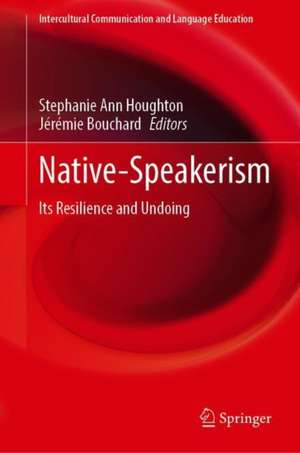Native-Speakerism: Its Resilience and Undoing: Intercultural Communication and Language Education
Editat de Stephanie Ann Houghton, Jérémie Boucharden Limba Engleză Hardback – 14 noi 2020
| Toate formatele și edițiile | Preț | Express |
|---|---|---|
| Paperback (1) | 890.23 lei 6-8 săpt. | |
| Springer Nature Singapore – 14 noi 2021 | 890.23 lei 6-8 săpt. | |
| Hardback (1) | 744.31 lei 38-44 zile | |
| Springer Nature Singapore – 14 noi 2020 | 744.31 lei 38-44 zile |
Preț: 744.31 lei
Preț vechi: 979.37 lei
-24% Nou
Puncte Express: 1116
Preț estimativ în valută:
142.43€ • 146.93$ • 118.85£
142.43€ • 146.93$ • 118.85£
Carte tipărită la comandă
Livrare economică 22-28 martie
Preluare comenzi: 021 569.72.76
Specificații
ISBN-13: 9789811556708
ISBN-10: 9811556709
Pagini: 287
Ilustrații: XI, 287 p. 20 illus.
Dimensiuni: 155 x 235 mm
Greutate: 0.59 kg
Ediția:1st ed. 2020
Editura: Springer Nature Singapore
Colecția Springer
Seria Intercultural Communication and Language Education
Locul publicării:Singapore, Singapore
ISBN-10: 9811556709
Pagini: 287
Ilustrații: XI, 287 p. 20 illus.
Dimensiuni: 155 x 235 mm
Greutate: 0.59 kg
Ediția:1st ed. 2020
Editura: Springer Nature Singapore
Colecția Springer
Seria Intercultural Communication and Language Education
Locul publicării:Singapore, Singapore
Cuprins
Introduction.- Part I The ‘resilience’ of native-speakerism.- 1. The resilience of native-speakerism: A realist perspective.- 2. Native-speakerism and nihonjinron in Japanese higher education policy and related hiring practices: A focus on the Japanese ‘top global universities’ project.- 3. English as a foreign language teachers’ understandings of the native/non-native dichotomy: An Argentine perspective.- 4. Overcoming native-speakerism through post-native-speakerist pedagogy: Gaps between teacher and pre-service English teacher priorities.- Part II The ‘undoing’ of native-speakerism.- 5. Menburyu and the shaguma: (De)constructing (inter)national cultural practices and symbols within a post-native-speakerist framework.- 6. A multilingual paradigm: Bridging theory and practice.- 7. ‘Native’ Japanese speaker teachers in Japanese language education at primary and secondary schools in Australia.- 8. Challenging and interrogating native speakerism in an elementary school professionaldevelopment programme in Japan.- 9. Post-native-speakerism and the multilingual subject: Language policy, practice and pedagogy.- 10. Fostering students’ empathy and cultural sensitivity to undo native-speakerism: A case study of a transnational education platform involving universities in Hawai‘i and Japan.- 11. Public dialogue, disruptive spaces, and the undoing of native-speakerism.
Notă biografică
Stephanie Ann Houghton PhD is an Associate Professor of Intercultural Communication at the Faculty of Art and Regional Design, Saga University, Japan. She has published multiple academic books and articles in peer-reviewed international journals. She is co-editor of the book series Intercultural Communication and Language Education with Melina Porto. Addressing the development of intercultural communicative competence, her main research areas include intercultural dialogue, native-speakerism and citizenship education, with a special focus on the prevention of Alzheimer’s disease.
Jérémie Bouchard PhD is an Associate Professor at the Faculty of Humanities, Hokkai Gakuen University, Sapporo, Japan. In his research, he adopts a sociological approach to the study of language, language-in-education policy, and intercultural communicative competence as emergent outcomes of the complex interactions between culture, structure and agency.
Textul de pe ultima copertă
This book explores native-speakerism in modern language teaching, and examines the ways in which it has been both resilient and critiqued. It provides a range of conceptual tools to situate ideological discourses and processes within educational contexts. In turn, it discusses the interdiscursive nature of ideologies and the complex ways in which ideologies influence objective and material realities, including hiring practices and, more broadly speaking, unequal distributions of power and resources. In closing, it considers why the diffusion and consumption of ideological discourses seem to persist, despite ongoing critical engagement by researchers and practitioners, and proposes alternative paradigms aimed at overcoming the problems posed by the native-speaker model in foreign language education.
Caracteristici
Unpacks problems presented by the native-speaker model in foreign language education programs Provides a range of conceptual tools to situate ideological discourses and processes within educational contexts Documents some of the shifts underway from native-speakerism to post-native-speakerism






